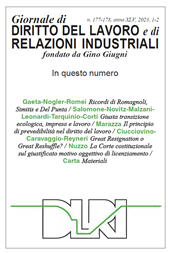A proposito di un libro di W. Däubler e M. Kittner sulla partecipazione dei lavoratori in Germania : un'opera ricca di spunti interessanti anche per latransizione ecologica
P. 143-175
Il saggio ripercorre in chiave diacronica la partecipazione dei lavoratori in Germania, focalizzandosi sulla c.d. cogestione d'azienda (betriebliche Mitbestimmung), sicuramente meno conosciuta e studiata nel nostro Paese rispetto a quella societaria (unternehmerische Mitbestimmung). L'occasione è offerta dalla lettura del volume di W. Däubler e M. Kittner, Storia e futuro dell'ordinamento aziendale, che nel 2022 è stato pubblicato in seconda edizione. Dopo aver inquadrato la partecipazione dei lavoratori in Germania nel contesto europeo, l'Autore ne ripercorre le vicende principali, soffermando l'attenzione sulla legge sull'ordinamento aziendale del 1972, che ancora oggi regola struttura e prerogative dei consigli d'azienda.
L'obiettivo è restituire al lettore italiano non soltanto il quadro giuridico, ma soprattutto il contesto storico-sociale nel quale le strutture partecipative sono maturate, nonché il loro funzionamento nella prassi. Nella seconda parte del contributo sono affrontate le sfide della contemporaneità, con particolare attenzione ai temi della sostenibilità ambientale. L'esperienza tedesca, pur non replicabile nel nostro Paese, invita ad affrontare senza ulteriori indugi il tema del sostegno legislativo alla partecipazione. [Testo dell'editore]
The essay deals with employee participation in Germany, by focusing upon the so called codetermination at plant level (betriebliche Mitbestimmung), which is certainly less known and studied in our Country than codetermination at the company level (unternehmerische Mit-bestimmung). The cue is given by the reading of the volume of W. Däubler and M. Kittner, History and future of the workplace order, which in 2022 was published in second edition. After framing employee participation in Germany in the European context, the author analyses its most important events, by concentrating his attention on the Act on the workplace order of 1972, which still now regulates the structure and prerogatives of works councils.
The goal is to offer the Italian reader not only the juridical frame, but also the historical and social context in which the participative structures have developed, and their practical working in the real life. In the second part of the contribution contemporary challenges are dealt with, with particular attention given to the topic of ecological transition. The German experience, though not replicable in our Country, invites us to address without delay the problem of the legislative support to employee participation. [Publisher's text]
-
Artikel aus derselben Ausgabe (einzeln erhältlich)
-
Informationen
ISSN: 1972-5507
THEMENBEREICHE
KEYWORDS
- Germania, Partecipazione dei lavoratori, Consigli d'azienda, Cogestione, Codecisione, Sostenibilità ambientale, Transizione ecologica
- Germany, Employee participation, Works councils, Codetermination, Ecological transition


